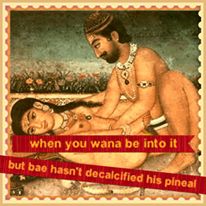
A detail from the medical thangka paintings commissioned by the Fifth Dalai Lama’s Regent, tantric yogi-doctor Desi Sangye Gyatso (1653 – 1705), as accompanying illustrations for the teachings in the Gyushi (rgyud bzhi) or ‘Four Medical Tantras’, the core textbook of exoteric Tibetan medicine. The detail depicts representative examples of the “two communities of Buddhist renouncers and virtuous spiritual guides who are [valid] objects for offerings/reverence”, that is, the community of ‘shaved-headed, saffron robed monastic renouncers’ and the ‘community of long-haired, white robe-wearing tantric yogi/nis or householder renouncers’ known as ngakpa/ma.
Great news, friends!
My full PhD dissertation in cultural anthropology, titled ‘White Robes, Matted Hair: Tibetan Tantric Householders, Moral Sexuality, and the Ambiguities of Esoteric Buddhist Expertise in Exile’ is now available open-access to download via ProQuest. It’s over 500 double-spaced pages and has more typos than I’d like, but it earned me a doctorate.
Here’s the thesis abstract and link for those who’d like to download and read it. I hope that whatever small insight and merit might be in its pages may spread and bring benefit!
“White Robes, Matted Hair: Tibetan Tantric Householders, Moral Sexuality, and the Ambiguities of Esoteric Buddhist Expertise in Exile
by Joffe, Ben Philip, Ph.D., University of Colorado at Boulder, 2019, 542; 27663085
Abstract (Summary)
This dissertation offers an ethnographic study of ngakpa/ma (sngags pa/ma, m.f.)–Tibetan Buddhist non-monastic, non-celibate tantric yogis and yoginis–living in the Tibetan diaspora. Like monks and nuns, ngakpa/ma are professionally religious, yet unlike their monastic counterparts they can marry, have families, and pursue worldly work. Living in ‘the village’ like ordinary laypeople but also spending much of their time in retreat or working as ritual specialists for hire, ngakpa/ma occupy a shifting, third space between monastic renunciation and worldly attachments. Based on roughly five years of fieldwork research conducted in Tibetan and Tibetan Buddhist communities in India, Nepal, Northeastern Tibet, and the United States, this thesis explores how ngakpa/mas’ historically decentralized, morally ambiguous esoteric expertise has become implicated in various projects of cultural preservation and reform for exile Tibetans, even as it has come to circulate and have meaning well beyond the purview of ethnic Tibetan communities and interests. Chapters One to Five offer an overview of how ngakpa/ma and ngakpa/ma orientations have been pinned down (or have failed to be pinned down) in exile, via language; gendered divisions of labor; in physical space and permanent institutions; through hair, clothing, and embodied comportment; and as part of new family and career trajectories. Chapters Six to Nine examine how contentious esoteric tantric yogic practices, associated with sexuality and Tibetan medicine in particular, are being popularized and reframed in exile in new ways and for new audiences as part of increasingly transnational networks of exchange. In these chapters, I underscore the polysemous quality of tantric practices, and reflect on my own collaborations with a Tibetan ngakpa-doctor to translate and share information on Tibetan tantric yogic practices more widely. In conclusion, I assess trends and quandaries that have dominated the academic study of secrecy and esoteric religions and highlight the implications and value of an ethnographic approach to researching tantric traditions.”








